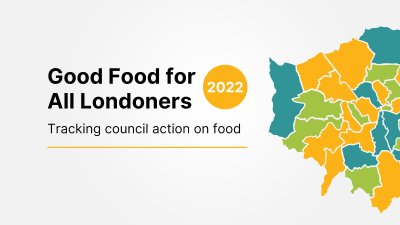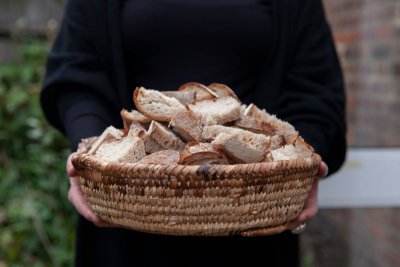Response to the consultation on the Development of the London Housing Strategy, 2005.
Government Office for London
8th Floor, Riverwalk House
157-161 Millbank
London SW1P 4RR
1st February, 2005
Dear Helen Marks,
Thank you for the opportunity to respond to the consultation on the Development of the London Housing Strategy, 2005.
The London Development Agency (LDA) is currently preparing a sustainable food and farming strategy for London. The Mayor of London has also established a mayoral food board (known as 'London Food') to develop food policies which will benefit the health and welfare of Londoners and to help develop a fairer and more sustainable food system in London.
Sustain and the Food Commission are working under contract to the LDA, to develop guidelines useful to planners, social housing organisations, local authority staff, Primary Care Trusts and local food and health organisations. The aim is to stimulate work that will improve access to healthy and affordable food in deprived areas of London. Sustain and the Food Commission are national not-for-profit organisations working to promote healthy and sustainable food for all.
The need for this work has arisen in part due to a new emphasis on 'prevention' of disease, as signalled in the 2004 government Public Health White Paper putting new responsibilities on local authorities and Primary Care Trusts to work on improving diets. It is estimated that around one third of coronary heart disease and one third of cancers are attributable to poor diets, with an additional burden of disease caused by the alarming rise in obesity. In actions planned to tackle these problems, there is also a specific focus on health inequalities, since people from low-income backgrounds suffer disproportionately from diet-related disease. In some London boroughs, there is a 10 year difference in life expectancy between people living in different wards of the same borough. This is largely due to environmental factors and lifestyle factors, such as smoking and poor diets.
The LDA is therefore investigating how local authorities could help to improve the diets of people living in deprived communities in London.
Some initiatives to improve diets focus purely on education and raising awareness of healthy eating. But unless healthy foods are available locally, people will find it difficult, if not impossible, to achieve healthier eating habits. Conversely, retailers might decide to
change to offering healthier food, but unless their customers can afford the food, and
know how to prepare it, the retailer will not find a ready market for its products.
In developing a framework to address dietary problems in a coherent way, Glasgow's Healthy City Partnership has found a useful means of summarising the range of different areas that need to be addressed. This has formed the basis of a Food and Health Action Framework (2001 to 2006) that involves many different agencies from across the local authority and voluntary sector, working in partnership to improve the health of Glasgow 's most socially excluded citizens.
Initiatives to improve diet, especially for people living in deprived areas, need to improve:
Awareness of healthier eating themes
Access to information programmes /services relating to food
Affordability of healthy food
Availability of safe and nutritious food to all.
The work we are undertaking for the LDA focuses on the environmental factors affecting food choice the Affordability and Availability of safe and nutritious food for all. Specifically, our work for the LDA is looking at the positive contributions that could be made by:
Social housing organisations (Registered Social Landlords RSLs)
Spatial and economic planners working in local authorities
working in partnership with Primary Care Trusts and other local government and voluntary agencies.
We are therefore delighted to see that the draft London Housing Strategy acknowledges that:
A decent home does not stop at the front door and the environment outside the home is a fundamental determinant of how good a place to live that home can be.
We welcome this emphasis on a holistic approach to housing, setting it in the context of residents' lifestyles and the environment.
We would, however, encourage you to consider that 'the environment outside the home' includes the opportunities available for people to access basic goods and services that contribute to their overall well-being. We would also encourage you to make specific reference to these factors, naming them in the strategy, and giving an indication of how these can be beneficial. It might also be useful to indicate how addressing these factors can contribute to local targets on, for instance, health, health inequalities, obesity reduction, coronary heart disease prevention, car-use reduction, etc. These include:
Opportunities to enjoy green space and physical exercise (to contribute to community cohesion and opportunities to engage in physical exercise)
Opportunities to buy a good range of healthy and affordable food (to contribute to greater enjoyment, wellbeing and satisfaction of basic needs, to ensure that everyday essential journeys can be made on foot, and to contribute to better health)
There are several ways in which housing policy can be made to support these goals. Some of this will come via the planning system, in provision and protection of green space and provision and ongoing promotion and protection of neighbourhood retail outlets. Landlords, working in partnership with other local agencies, can make an enormous contribution to improving food retail access through, e.g. engaging with crime reduction strategies, contributing to physical infrastructure improvement, providing premises for e.g. food co-operatives, breakfast clubs or cook-and-eat sessions, and undertaking resident surveys and consultation to identify needs and concerns.
Improving access to healthy and affordable food is especially important in the area of social housing, which is likely to have a high proportion of low-income and disadvantaged residents many of them with physical challenges e.g. elderly residents, and parents with young children. It is particularly important that in these communities, premises for neighbourhood food retailing are built in at the planning stage, and then supported and promoted on an ongoing basis. A measure of the distance considered to be reasonable access to basic services such as food provision is generally between 400 to 500m.
A complimentary approach is to build in opportunities for street and covered markets as part of an holistic housing plan. You may like to note that the LDA Food Strategy Unit has just commissioned a piece of research into the environmental and social impact of street markets to support anecdotal evidence of the benefits of markets in terms of flexibility, fostering new start-up businesses, attracting footfall into an area, and providing healthy and affordable food that matches the expectations of diverse ethnic communities.
We are very concerned, therefore, to note that there is no explicit mention of food in the draft Housing Strategy. Equitable access to healthy and affordable food is a key contributor to sustainable communities, in terms of health, tackling health inequalities, and fostering wellbeing.
We would like to see that the issue of food access, the provision of space for markets, and the need for sustainable approaches to local, accessible food retailing are specifically mentioned in the Housing Strategy, and suggest that these could be integrated into sections 4.47/4.49 on Improving the physical environment of local neighbourhoods, and 4.3.3 Creating mixed and sustainable communities.
Thank you for your consideration of these suggestions and concerns.
Yours sincerely,
Kath Dalmeny
Senior Policy Officer, The Food Commission
Working with:
Tejal Patel, Food Access Project Officer (Housing): The Food Commission
Ben Reynolds, Coordinator, London Food Link, Sustain: The alliance for better food and farming
Cc: Niall Machin, Food Strategy Unit, London Development Agency; Mark Ainsbury, Food Strategy Unit, London Development Agency
- ENDS -
Please click here to download the document
Published Tuesday 1 February 2005
London Food Link: London Food Link brings together community food enterprises and projects that are working to make good food accessible to everyone in London to help create a healthy, sustainable and ethical food system for all.





